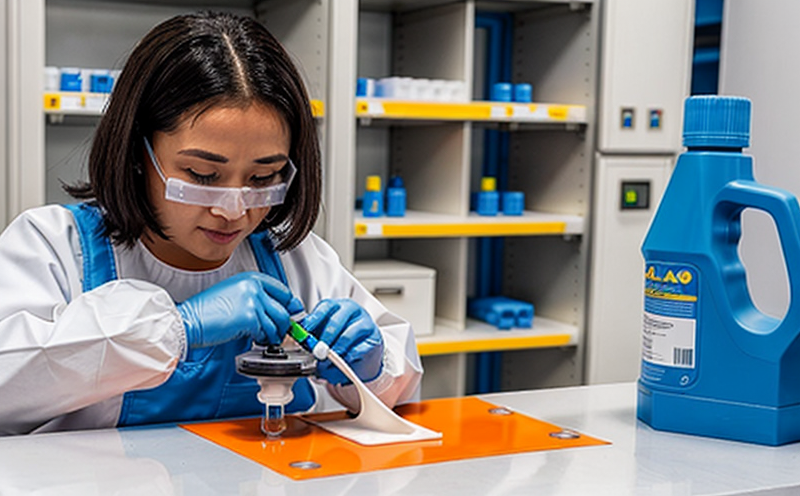ASTM D2196 Rheological Testing of Adhesives with Nano Additives
The ASTM D2196 standard provides a method to determine the rheological properties of adhesives, which is essential for understanding their behavior in various applications. When nanomaterials are introduced into these formulations, rheological testing becomes even more critical as it can significantly alter the adhesive's flow and curing characteristics. This service focuses on ASTM D2196 rheological testing specifically tailored to nano additives used in adhesives and sealants.
The addition of nanomaterials such as carbon nanotubes or graphene oxide into adhesives not only enhances mechanical properties but also affects the adhesive's viscosity, elasticity, and flow behavior. Rheological tests help to quantify these changes by measuring the shear stress and strain rate relationship under different temperature and time conditions.
For accurate rheological testing of nano-additive-containing adhesives, careful sample preparation is necessary. This includes ensuring that the nanomaterials are well-dispersed throughout the adhesive matrix. The test setup typically involves a rheometer equipped with appropriate geometries such as parallel plates or cone-plate assemblies to measure shear stress and strain.
The testing process adheres strictly to ASTM D2196 guidelines, which specify temperature ranges from room temperature up to 30°C for most applications. Specimens are prepared by applying a known amount of adhesive onto the specified geometry at the set temperature and then allowing it to cure according to manufacturer recommendations.
Upon completion of curing, rheological tests are conducted using shear stress or oscillatory frequency sweeps. The data obtained from these tests provides insights into how the introduction of nanomaterials influences the adhesive's viscoelastic properties. This information is crucial for quality managers and compliance officers who need to ensure that products meet regulatory requirements.
Understanding the rheological behavior of nano-additive-containing adhesives also aids R&D engineers in optimizing formulations for specific applications like aerospace, automotive, or construction industries where adhesion strength and flexibility are critical factors. For procurement teams, this service ensures they receive materials that perform as expected under various environmental conditions.
The ASTM D2196 method allows for the precise quantification of rheological parameters such as viscosity, yield stress, and elasticity modulus. These metrics provide valuable data on the performance of nano-additive-containing adhesives across different temperature ranges and curing times.
| Temperature Range | Rheological Parameter Measured | Description |
|---|---|---|
| Room Temperature to 30°C | Viscosity, Yield Stress, Elasticity Modulus | Data points used to assess the impact of temperature on adhesive properties. |
| 25°C | Dynamic Shear Viscosity and Storage/Gloss Moduli | Key metrics for evaluating adhesive performance in standard conditions. |
The results from ASTM D2196 rheological testing are reported comprehensively, including raw data, graphs of shear stress vs. strain rate, and calculated values of primary rheological parameters. This detailed reporting allows stakeholders to make informed decisions regarding product development, quality assurance, and compliance.
Why It Matters
Rheological testing is vital for ensuring that nano-additive-containing adhesives meet the stringent performance requirements needed across various industries. The mechanical properties of these materials are heavily influenced by their rheological characteristics, which can vary significantly based on temperature and curing time.
- Ensures compliance with industry standards
- Improves product quality through precise evaluation
- Aids in optimizing formulations for specific applications
- Facilitates regulatory compliance by providing accurate test results
The ability to accurately measure and report rheological properties is essential for maintaining high-quality products that perform consistently under diverse conditions. This service supports the continuous improvement of nano-additive-containing adhesives, ensuring they meet current and future market demands.
Benefits
- Enhanced Mechanical Performance: Rheological testing helps identify how nanomaterials enhance the mechanical properties of adhesives.
- Consistent Quality: By measuring rheological parameters, quality managers can ensure consistent product performance.
- Informed Decision-Making: Detailed reports provide valuable data for R&D and procurement teams to optimize formulations and select appropriate materials.
- Regulatory Compliance: Accurate testing ensures that products meet all relevant regulatory standards.
The precision of ASTM D2196 rheological testing allows stakeholders to make informed decisions that lead to better product performance, enhanced customer satisfaction, and increased market competitiveness.
Industry Applications
| Industry Sector | Specific Application | Rationale for Testing |
|---|---|---|
| Aerospace | Structural Adhesives in Aircraft Construction | Ensures adhesion strength under high stress and temperature variations. |
| Automotive | Body Panels and Assembly Bonds | Evaluates adhesive performance across a range of environmental conditions. |
| BUILDING & CONSTRUCTION | Sealants and Joint Fillers | Assesses durability and flexibility in varying climatic conditions. |
The ASTM D2196 rheological testing of nano-additive-containing adhesives is critical for ensuring that these materials perform reliably in the demanding environments characteristic of these industries. By providing accurate data on viscosity, yield stress, and elasticity modulus, this service supports the development of high-performance adhesives tailored to specific applications.





